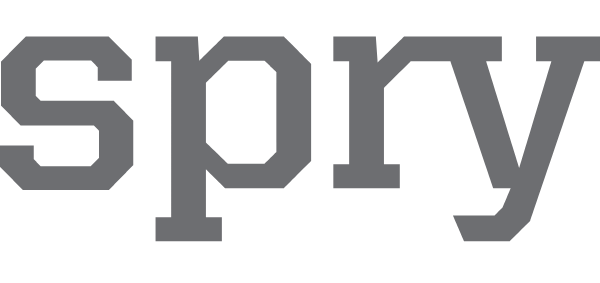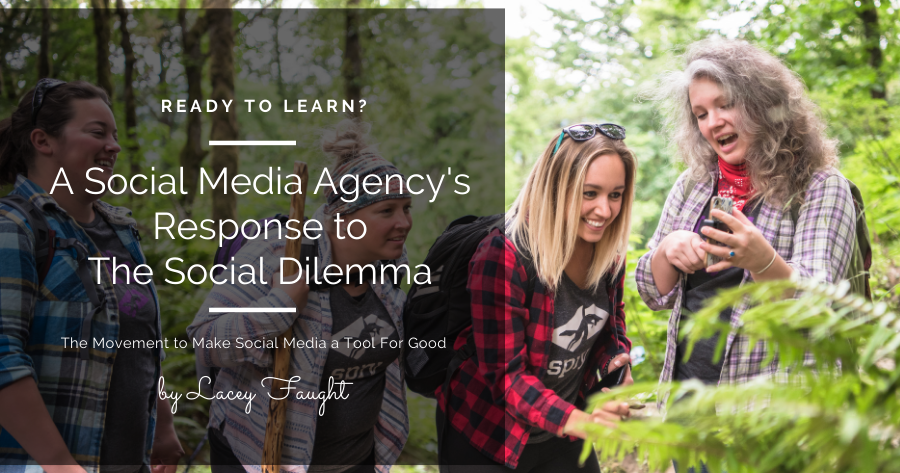The Social Dilemma
In 2019, Spry started an initiative called Guidelines for a Healthy Digital Life where we go to elementary schools and present on the positives and the dangers of social media. Why? Because we know that people have an unhealthy relationship with social media, and if we want to keep our jobs for a long time, we need to be part of the movement to make social media a tool for good, or else it will implode.
So in September 2020 when The Social Dilemma was released on Netflix in the USA, our interest was immediately piqued. The Social Dilemma is a 90-minute docu-drama that flashes back and forth between interviews with many of the foundational creators and designers of today’s popular social media platforms and a scripted drama piece portraying a family struggling through issues stemming from their addiction to social media. It discusses how social media algorithms, in some ways, skew reality and make unclear what is true for millions of Americans.
The Social Algorithms
Here’s the thing though… algorithms are math problems, and the solution for most social media algorithms is increased revenue. Not truth. Not health. Revenue. So, with that in mind, we see the algorithms solving for increased revenue through increased users, use, and engagement. The more people spend time on the platform and engage, the more data the computers get to make better calculations about how to make more money through more predictable advertising responses.
More users. More use. More engagement. More advertisers. More money.
The Social Addiction

The original designers and developers of social media just wanted to create something cool that people would like. As the platforms took off, the companies started using growth hacking tactics to bring more attention from investors and increase the perceived value of their platforms. What are they hacking, though? Sean Parker, former President of Facebook, says the creators understood consciously they were hacking a vulnerability in human psychology and they did it anyway.
For many people, social media is not a tool anymore. It’s not just something you can pick up and put down. It seduces you, manipulates you, addicts you, and profits off your addiction. Dr. Anna Lembke, Medical Director of Addiction Medicine at Stanford University School of Medicine, explains that social media is a drug. “We have a basic biological imperative to connect with other people that directly affects release of dopamine… to get us to come together, live in communities etc.”
In the last decade as computing power increased and devices became smaller, people gained 24/7 access to social media and the dopamine hits coming from social media connections. Dr. Lembke explains that this causes issues with our pleasure-pain balance. It puts users in dopamine deficit states. Social media exploits our evolutionary need to connect. That’s not the worst of it though…
The Social Manipulation
In 2018 MIT released a study showing that false news spreads faster than true news on social media. “The degree of novelty and the emotional reactions of recipients may be responsible for the differences observed.” Emotionally triggering content is more likely to spread than truth.
When used with ignorance of the algorithms, communities divide. Cynthia Wong, Former Senior Internet Researcher at Human Rights Watch, told about how in Myanmar, Facebook is auto-loaded on smart phones and is the only tool smart phone owners use to access the internet on their phone.
“Facebook gave the military and other bad actors (in Myanmar) a new way to manipulate public opinion and to help incite violence against Rohingya Muslims that included mass killings, burning of entire villages, mass rape, and other serious crimes against humanity.”
Renée DiResta, Research Manager at Stanford Internet Observatory; Former Head of Policy at Data for Democracy says, “The platforms make it possible to spread manipulative narratives with phenomenal ease, and without very much money.”
Tristan Harris, former Google Design Ethicist; Co-Founder & President of The Center for Humane Technology, says the tech industry created tools that can destabilize and erode the fabric of society. So what can we do about it…?
The Social Solution
Social media is the landscape where we work at Spry, and it’s a landscape many people use to connect, learn, entertain and express themselves. With awareness and intention, users can better understand and use social media as a tool.
What Social Media Managers Can Do
- Learn– Social media managers have a responsibility to learn the tool they’re using to make money. Learn the algorithms. Learn the analytics. Learn about community management.
- Teach – Teach brands about the algorithms. Teach brands the importance of creating valuable content for their communities. Teach them the importance of PRESENCE and engagement. Teach brands about how tricks and “growth hacks” are not sustainable or healthy for the social media environment. Teach foundational communications and marketing skills. The more businesses know about how to effectively communicate online, the cleaner and more valuable newsfeeds will become.
- Don’t Create Spam – Since social media is inherently a tool of manipulation, social media managers have a responsibility to create valuable content and align themselves with brands who want to do the same. Otherwise social media managers can become burnt out serving up posts of fried spam and fresh click bait.
What Individuals Can Do
- Create Boundaries – People are addicted to their phones. Addiction is exhausting. One amazing thing people can do to help break/lessen their addiction is charge their phone in another room at night. This practice allows people to disidentify from their phone. It keeps radio waves from being quite so close to their head while they sleep. It keeps people from looking at their phone right before bed or right when they wake up. Much peace can be gained by this practice.
- Say No in Notifications – Turn social media notifications off on phones and watches. Try it. It’s magical. Notifications are specifically designed to seduce users back into the platforms. It’s nice, sure, to get notified when tagged in photos etc, but people don’t need to know these things until they sit down for their designated social media time. Turning off notifications can keep people more present in their moments and stop them from mindless, accidental scrolling.
- Engage Intentionally – Remember, social media algorithms show users content to keep them engaged. So when users engage with content through slowing down on the post, clicking, reacting, commenting sharing etc, they tell the algorithm to put more content like THAT in their feed. So choose to engage only with desired content, even if it is emotionally stimulating or triggering.
What We The People Can Do
- Make Data Privacy a Priority – As a people, we’re trained to let go of our data. All social media users could work to better understand what data is being collected, and push lawmakers to create regulation similar to the European Union’s GDPR which forces companies to be more blatant about what they are collecting and how they’re using it.
- Address Addiction through Regulation – Many addictive substances are locally and federally regulated. As more and more data comes out showing the negative impact social media has on mental health, We the People can demand our legislators create committees to explore and regulate social media to protect children, especially, from the harmful impacts.
- Put More IT-Focused People in Congress – Sure, it’s great to have lawyers in Congress to help write laws, but there’s an apparent gap in understanding about the speed of computing power and the scale of data collected from private companies. We the People need IT representation in Congress to be able to move regulation at a faster speed. Currently, the 50-70 year old lawyers in Congress just can’t comprehend the impacts of social media data collection and social media mental health impacts quick enough to make any sort of a difference. We can work to change this.
- Appoint FCC Commissioners Who Focus on Mental Health, Addiction and Data Privacy – Currently, there are no IT professionals as FCC Commissioners. There are lawyers, but no IT professionals. Looking through the Commissioners’ bios, one can find their focus of bridging the digital divide and bringing equal access to all, but none of them are focused on mental health, addiction, and data privacy. This needs to change. We the People can demand it from our government.
- Create a Data Tax – Since social media and search engine companies have so much data on people, the idea of a data tax can be considered as well. This would be a deterrent to these companies to gather and store as much data as they currently do.

Adrienne Mills-Harvey, Lead Digital Strategist at Spry, says, “Similar to what humans had to do when faced with changes in the medical field, navigation, the invention of flight, farming, and more – now we need leaders to step up and guide us to some sense of order. The internet, and social media, are a creative, scientific invention brought to life by mathematicians, not psychologists or lawmakers. What we need is some intentional design, leadership that will act as steward through the next couple of years.”
The Social Dilemma brought to light a problem many people knew existed but didn’t know how to address. Let’s use this opportunity in history to contribute to the solution by learning, teaching, managing our own online behaviors, and demanding change through government regulation.


Recent Comments